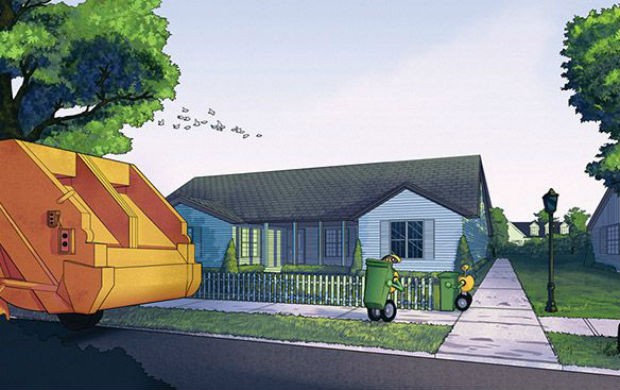The Robot Garbage Collectors Are Coming
Source: Aarian Marshall

Concept art of ROAR from September 2015. (Volvo Group)
The Volvo Group released a video of a fun little experiment late last week: an effort to destroy the livelihoods of garbage collectors as we know them.
Well, not quite. According to the students who worked on the Robot-based Autonomous Refuse handling (or ROAR) project, their self-driving, garbage-collecting prototype is just an exercise. “We predict a future with more automation,” Per-Lage Götvall, project manager for robot development in the Volvo Group, said in a statement. “This project is intended to stimulate our imagination, to test new concepts that may shape transport solutions of the future.”
The project—a collaboration between Volvo Group, Sweden’s Chalmers University of Technology and Mälardalen University, Penn State, and the Swedish waste management company Renova—makes use of a souped-up truck that comes with a small, wheeled robot and a drone. Using GPS, lidar (which measures distance with laser lights), cameras, and motion sensors combined with odometry, the drone first checks out the state of the trash can, then dispatches the larger robot to get ‘er done: fetch the trash can, dump it, and return the can to the curb.
The garbage truck’s (human) driver can use screens inside the cab to view what’s going on, and can take manual control of the system if something’s wrong. There’s also a “stop everything” emergency button, in case of out-of-nowhere children or dogs.
The project’s casual,“fun thought experiment” angle would be more convincing if it hadn’t released this concept art of Star Wars-prequel-like droids taking over trash duties by brute force (probably).
And yet, though this Volvo system looks futuristic, automated garbage collection is standard across many American communities. This less-unsettling systems still only use one human trash collector—the truck driver—but make use of strong pincers, which grab, hoist, and upend garbage cans into a truck before setting them back on the ground. These have gotten in some accidents. In January, a mechanical arm-equipped truck picked up a trash can and lamp post in Orange Country, Florida. The light did not survive the interaction.
A major 2013 study by researchers at Oxford University found that garbage collectors are particularly susceptible to automation—that is, to having their jobs taken over by robots. Collectors are not frequently required to come up with “clever” solutions to problems, to personally help others, or to negotiate: job characteristics that mark them for a robotic future. However, waste managers, or those who oversee complex garbage systems, will be very, very difficult to replace with a couple of computers, nuts, and bolts. If you’re making career choices now and want to avoid robot overlords, waste management is a good bet.
| }
|